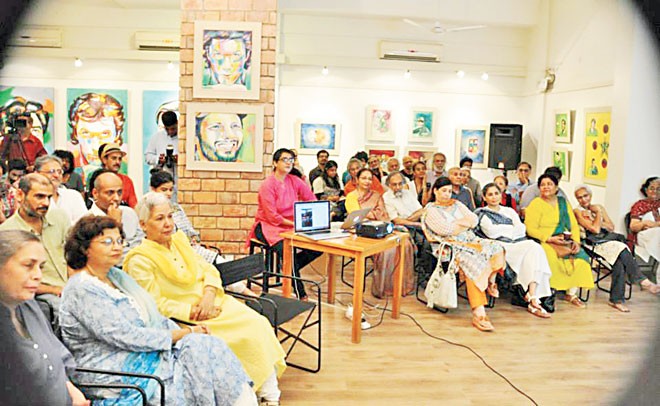
Instep takes a look inside two of Karachi's thriving cultural spaces and discovers a world where anyone is welcome - as long as they leave their conformity at the doorstep.

Portrait painters hawk their skills for half-hour sessions on encroached pavements in Saddar; other artists make neighbourhood walls from Lyari to Zamzama their canvas. Wandering minstrels roam the streets of Karachi to spread their song; dhol walas busk at roundabouts in hope of a job. Someone with strong opinions may scrawl them on a neighbourhood wall, only to have a dissenting party scratch them out and write their own. The argument ensues at chai waalas, barber shops, bus stands, wherever people meet. The arts and opinions live on in every nook and cranny of Karachi, then why do we dedicate whole spaces for ‘culture’?
"The word ‘culture’ has the same origins as the word ‘cult’," offers Faisal Gill, the man behind the little known musical sanctuary Keynotes, who insists that the place actually belongs to the people who frequent it.
A sound therapist by profession, Gill manages Aqil Premjee’s Children’s Academy of Performing Arts (CAPA) and works at a rehabilitation centre The Recovery House. At Keynotes, he has sessions with differently abled children in the mornings. In the evening, Keynotes shifts gears and becomes a jamming space, not so much for budding musicians, as for people looking to express themselves.
"People with the same values and virtues are likely to come together, (like they do in this space). That becomes their culture," Gill explained. Karachi’s cultural fabric is as variegated as they come; numerous subcultures are spread out throughout its sprawl, and some find home in spaces like Keynotes.
"Young people need to connect with each other. We go through school, disliked and misunderstood. We go abroad in the hopes of finding intellectual parity there, but often come home even more worn down. You get a 9-to-5 job and that’s the end of your life," Gill summarised the common plight of generations past and present.
"We live in the age of information overload yet find it hard to express ourselves. So it’s very important to have a place to vent. Music lets you do that. It also unifies people," he further said.
18 months in the running, and now tucked into a nondescript lane lined with beauty salons in Khadda Market, Keynotes enjoys a stream of occasional curious walk-ins. "We don’t advertise. People looking for it find it. The place has its own filter: people come and go, but there’s a core group that’s stuck around," shared Bilal, who manages Keynotes with Gill.
"If I had opened a sharaabkhana, I think more people would come," Gill jokes.
"Our jamming session is not for the public. It’s for those who stick around," he later concedes, "For the public, we have books and instruments that they can explore and experiment with". In addition to the standard guitars and keyboards, people can find instruments like the accordion, the qanoon (a Turkish piano) and a pair of Chinese harps. Their latest acquisition is a grand piano, and they’re looking for a santoor (a Persian dulcimer).
It’s no wonder that Gill calls their jamming ‘telepathic’. The possibilities are endless in this very fluid process where people just "spill themselves out." People’s brainwaves are synchronised as they play by ear and a dialogue is created without any words. This freedom to experiment reverses years of streamlined thought and behaviour in the system of indoctrination that pervades our schools.
In his three years of teaching experience, Gill has watched as happy, excited kindergartners who want to touch everything devolve into introverted adolescents who just feel misunderstood. "If you tell fifth graders what great kids they are, they won’t believe you! By grade 10 or 11, they’ve killed the soul of the child."
Sharing a distaste for traditional education with Gill is Sabeen Mahmud, the owner of T2F, which is widely acknowledged as the foremost cultural hub of Karachi. A substitute for schooling, a source of alternate education, call it what you will, T2F has been encouraging the exchange of new ideas, fostering talents of all kinds and intellectually stimulating the young and the old alike with its range of programming. From the Debating Circuit, Open Letters writers’ workshop and Jumma Hafta Art Bazaar exhibition for artists to lectures like Science Ka Adda, Philosophy 101 and the Perween Rahman series, T2F is a dream-come-true for hippie parents looking for an outlet not just for their growing children but for themselves too.
Borne out of the need to jolt people out of their apathy, T2F has been envisioned as, in Mahmud’s own words, "a public space for free speech and creative expression, … a safe haven for artists, musicians, writers, poets, activists, and thinkers – essentially anyone who wanted to escape the relentless tyranny of the city for a little while."
Described as "lofty, and frankly, a bit mad", the T2F vision has found followers in the thousands. With an open-door policy that even precluded the posting of a security guard at the front door, T2F is all about blurring lines not just between people who wouldn’t ordinarily find themselves seated next to each other, but between disciplines as well. Writing the T2F story for MIT’s Innovations journal, Mahmud says, "I continue to derive immense pleasure when an artist shows up for a science talk or a techie says, ‘I come to T2F to exercise the right side of my brain.’"
While we shouldn’t discredit the host of cultural activities that occur beyond the confines of these singular spaces, like gali cricket or street theatre, interventions like T2F and Keynotes ensure that the whole swathes of commercial activity that characterize Karachi’s geographical land use are interrupted by spaces dedicated to the arts and idea exchange – the kind of things that define a people’s identity.